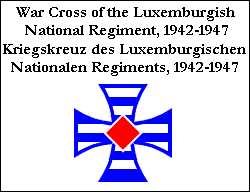Néckel
Néckel (Nikolaus, Niogul) was Grand Duke of Luxemburg from 1934 to 1950.
Early life
He was born in 1905 to Andreas and Juliana Nassau-Weilburg-Kastelnow, at the estate inherited from Andreas's parents in the Austrian Littoral. Nikolaus was named for his paternal grandfather. Andreas inherited the Grand Duchy of Luxemburg when Nikolaus was seven years old, and the family moved to their new realm in 1912.
In Luxemburg, Andreas and Nikolaus used the Lëtzebuergesch forms of their names. Néckel, as he was now known, married Princess Margarita Alexandra, daughter of the Württemberger King, in 1930. In 1934, his father abdicated after falling seriously ill; he died a year later. Néckel became Luxemburg's eighth Grand Duke.
Reign
Néckel came to the throne during a turbulent time in German history. Adolf Hessler was consolidating Prussia's power in Germany, and many German states opposed to his aims were facing outright annexation. The year of Néckel's coronation also saw Germany's Anschluß with Austria. Luxemburg had hosted several Prussian military bases for decades; during this period, their size was increased to levels similar to during the time of the First Great War.
His predecessors had been more or less grudging accomplices of the Prussian Kaisers. Néckel was much more a willing ally. He is often criticized for this today, but it should be pointed out that the Grand Duke was hardly alone in Luxemburg. The main political conflict in Luxemburg - and, in many ways, throughout Germany - was between Imperialists who favored a strong, united Germany; and Nationalists, who argued for local autonomy. In Luxemburg the two groups were more or less equally balanced in terms of numbers and influence, although many Imperialists would later deny their affiliation. As Germany prepared for war, many people were caught up in the spirit of pan-German patriotism. Prussia's support for Luxemburgish independence throughout the nineteenth century was not totally forgotten. And many people were eager to try another war against France.
Néckel was, therefore, a leading supporter of the Second Great War in Luxemburg. The governments of this period, supported by Prussia, were uniformly pro-Imperialist. Dissenters were silenced, occasionally with violent means. But during the early part of the war, the Imperialists indeed had broad popular support. The Luxemburgers cheered as German tanks rolled through France in 1940. In 1942 by Imperial decree, a purely Luxemburgish military was establishted for the first time since GW1: the Luxemburgish National Regiment. This was a purely defensive force that was in truth under almost total Imerial control. It was given charge of the borders and the increasingly obsolete Fortress. Troops fighting abroad continued to wear Imperial uniforms.
Public opinion swiftly changed as the war drew to a stalemate, then turned against Germany. In 1948, the Russians invaded from the east, and the Allied Powers drove the Germans back from the west. Early in 1949, the Fortress surrendered to a largely Federated Kingdoms force after a lengthy and bloody siege. The Allies occupied the country.
In 1950, a Nationalist government was elected to the Diet. They demanded Néckel's abdication. Incredibly unpopular after the failed war, he had little choice but to comply. He left his teenage daughter Tréis to rule the country under the regency of Countess Maeradlaede and her sister Carlina, while he and his wife moved to the Saarland with their two younger daughters.
After Abdication
The family faced difficult times. Although Alexandra and Nikolaus (again using his German name) remained in contact with their daughter, being cut off from her by politics would be difficult for any family. In addition, they faced financial trouble: among other things, they had lost the family estate in Istria during the Communist revolution that formed the CSDS. Tréis was able to spare a small allowance for them from the grand ducal household, but the postwar economy was unkind to everyone in Germany, the Nassau-Weilburg-Kastelnows included.
In 1955, Alexandra unexpectedly became pregnant with a fourth child, a son, Friedrich. Under the ancient laws and customs of the family, Friedrich was in fact the male-line heir to the leadership of the House of Nassau. Nikolaus, Tréis, and Queen Julianne of the Batavian Kingdom negotiated the dynastic compromise in 1961 that allowed Friedrich to be named Titular Duke of Nassau; this is described in more detail in the page on Tréis's reign.
As a postscript, Nikolaus and his family were able to shore enough money to buy the old, burned-out ruin of the family seat in Weisbaden, Hessen. The laws of the People's State prevented him from using the title Duke while in the country, but he got away with "Titular Duke" and "Head of the House of Nassau". Nikolaus von Nassau, as he was now known, itched for political life again and became a resident of Westphalia in order to run for the Westphalian Parliament, serving from 1971 to 1978. He lived a long and relatively quiet life, returning to Weisbaden permanently in 1981 and passing away peacefully the same year.
Arms
While Grand Duke, Néckel used the same arms as the Nassau-Weilburg-Kastelnows before and after him. After 1961, he used the simple arms of Nassau (azure, billety or, a lion rampant or), sometimes adding Kastelnow as an inescucheon. He topped these with a simple helm to indicate his lack of sovereignty and surrounded it with the collar of the Order of the Golden Lion of the House of Nassau, of which he was made Grand Master.
| |||
|---|---|---|---|
| House of Bonaparte | |||
| Napoleon I | Napoleon II | Napoleon III | |||
| House of Orange-Nassau | |||
| Wëllem I | |||
| House of Nassau-Weilburg | |||
| Aedul | Wëllem II | |||
| House of Nassau-Weilburg-Kastelnow | |||
| Änder | Néckel | Tréis | Haedrana |

